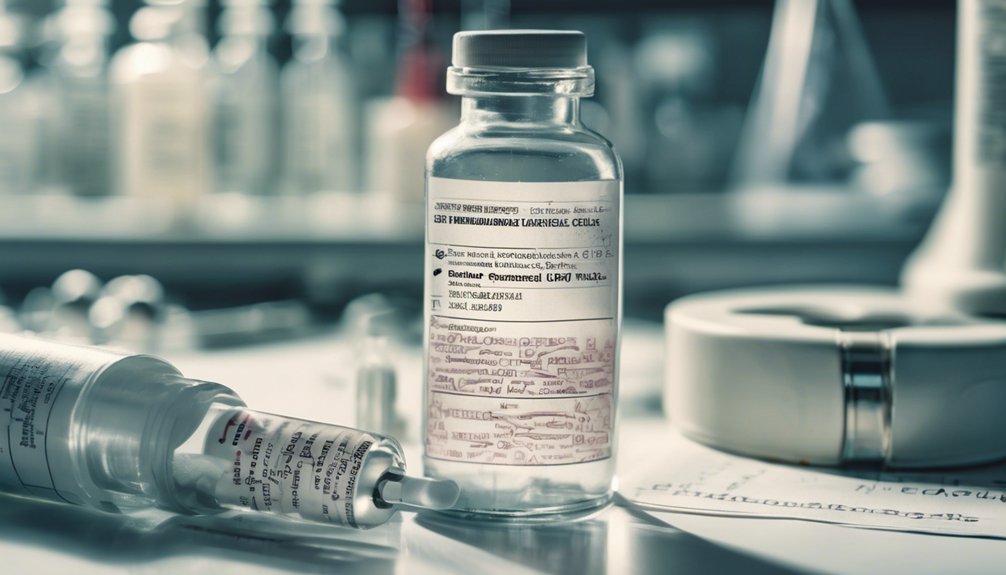Consider a patient with advanced cancer who reports feeling better after taking fenbendazole, a deworming agent. While such anecdotal cases can be compelling, they raise important questions about the drug’s safety and efficacy in oncology. Experts caution against jumping to conclusions without rigorous scientific backing. What do oncologists really think about this off-label use, and what should you know before considering it for treatment?
Key Takeaways
- Doctors express caution regarding fenbendazole’s off-label use, citing a lack of rigorous scientific studies validating its efficacy in cancer treatment.
- Anecdotal evidence from patients shows mixed results, highlighting the need for more comprehensive research to support claims of health improvement.
- Oncologists emphasize the importance of discussing potential risks and benefits with patients before considering off-label treatments like fenbendazole.
- Current research on fenbendazole is limited, underscoring the necessity for clinical trials to assess safety, tolerability, and effectiveness in cancer therapy.
- Open dialogue between healthcare providers and patients about alternative treatments is essential for informed decision-making regarding cancer care options.
Understanding Fenbendazole: What Is It and How Does It Work?

Although fenbendazole is primarily known as an antiparasitic medication for animals, its potential mechanisms of action have drawn interest in the context of cancer treatment.
Researchers suggest that fenbendazole may interfere with microtubule formation, impacting cellular division and potentially leading to cancer cell death. This mechanism overview highlights its possible applicability beyond veterinary use.
However, it’s crucial to remain cautious; fenbendazole’s interactions with other medications could alter its effectiveness or cause adverse effects. If you’re considering its use for cancer treatment, consult healthcare professionals to evaluate potential drug interactions and ensure patient safety.
The Rise of Off-Label Drug Use in Oncology
As the landscape of cancer treatment evolves, off-label drug use has gained traction among clinicians and patients alike. This practice, while controversial, often emerges from a desire for more effective cancer treatments when standard options fall short.
You might feel:
- Hopeful for new possibilities, even when conventional methods fail.
- Concerned about the safety and efficacy of off-label prescribing.
- Empowered to explore alternative therapies that could enhance quality of life.
Many healthcare providers are cautiously navigating this terrain, weighing the potential benefits against the risks.
Healthcare providers carefully assess the benefits and risks of off-label prescribing in the evolving landscape of cancer treatment.
It’s essential to approach off-label prescribing with evidence-based discussions, ensuring that you’re fully informed.
Ultimately, this rise in off-label use reflects a collective urge to improve patient outcomes in the fight against cancer.
Anecdotal Evidence: Patient Experiences With Fenbendazole
Patient experiences with fenbendazole in the context of cancer treatment have surfaced as a focal point for many seeking alternatives beyond conventional therapies.
Numerous patient testimonials highlight varying treatment outcomes, where some describe improved health and symptom relief after using fenbendazole.
However, it’s essential to approach these accounts with caution. While anecdotal evidence can be compelling, it lacks the rigorous scientific validation necessary for establishing efficacy and safety.
As a caregiver or patient, it’s vital to weigh these personal stories against clinical evidence and consult healthcare professionals before considering fenbendazole as part of a treatment plan.
Understanding the limitations of anecdotal information can help guide informed decisions in the complex landscape of cancer treatment options.
Expert Opinions: What Oncologists Are Saying

What do oncologists really think about the off-label use of fenbendazole in cancer treatment?
While some patients report positive outcomes, oncologist perspectives vary significantly. Many emphasize caution and the need for rigorous scientific evidence before making treatment recommendations.
Oncologists highlight the importance of rigorous evidence and caution regarding the off-label use of fenbendazole in cancer treatment.
They often express concerns such as:
- The lack of comprehensive studies to confirm efficacy in cancer treatment.
- Potential interactions with standard therapies that could compromise patient health.
- The importance of prioritizing evidence-based approaches to ensure patient safety.
Oncologists advocate for open discussions with patients about alternative treatments but stress the necessity of relying on well-researched methods.
Ultimately, your oncologist’s insights can guide you toward safe and effective treatment options.
Evaluating the Scientific Research on Fenbendazole and Cancer
There’s growing interest in the off-label use of fenbendazole as a potential treatment for cancer, fueled by anecdotal reports from patients.
However, when evaluating the scientific research, it’s crucial to approach this topic with caution. Preliminary studies suggest that fenbendazole may affect specific cancer pathways through various mechanisms, such as disrupting microtubule formation and interfering with cellular energy production.
Yet, the existing research is limited and often lacks robust clinical trials. As you consider this option, it’s essential to weigh the evidence carefully, understanding that more comprehensive studies are needed to establish its safety and efficacy.
Always consult with a healthcare professional before making decisions that impact treatment plans for yourself or others.
Potential Risks and Side Effects of Fenbendazole
While exploring the potential benefits of fenbendazole for cancer treatment, it’s essential to remain aware of the potential risks and side effects associated with its use.
Although some patients report positive outcomes, safety concerns are critical to consider:
- Gastrointestinal issues: You might experience nausea, diarrhea, or abdominal pain.
- Allergic reactions: Some individuals could have adverse reactions, including rash or difficulty breathing.
- Drug interactions: Fenbendazole may interact with other medications, complicating your treatment plan.
Before considering fenbendazole, consult with healthcare professionals to weigh these risks against any potential benefits.
Consult healthcare professionals to carefully evaluate the risks and benefits of fenbendazole before making any decisions.
Understanding the implications of off-label use is crucial for making informed choices that prioritize your well-being and that of those you care for.
The Importance of Evidence-Based Medicine

As you consider treatments like fenbendazole for cancer, embracing evidence-based medicine is crucial in ensuring your choices are informed and effective. This approach relies on evidence synthesis to guide clinical decisions, balancing patient needs with the best available research. By adhering to clinical guidelines, you can navigate complex treatment landscapes with greater confidence.
| Evidence-Based Medicine | Importance |
|---|---|
| Informed Decisions | Reduces risks |
| Patient-Centered Care | Enhances outcomes |
| Quality Research | Validates treatments |
| Safety Protocols | Minimizes harm |
Choosing treatments supported by rigorous evidence not only empowers you but also supports your healthcare team in providing the best possible care. Always consult with healthcare professionals to discuss your options comprehensively.
Navigating Alternative Treatments: A Patient’s Guide
Exploring alternative treatments can be tempting, especially when faced with a cancer diagnosis. You may feel empowered to seek out options that resonate with you, but it’s crucial to navigate this path cautiously.
Consider these key points:
- Understand the evidence: Not all alternative treatments have solid research backing their efficacy.
- Consult with your healthcare team: Open dialogue about your treatment choices ensures safety and support.
- Be wary of false promises: Some alternatives may exploit your hopes during this vulnerable time.
Future Directions for Research on Fenbendazole in Cancer Therapy
Given the emerging interest in fenbendazole as a potential cancer therapy, researchers are now focusing on rigorous studies to better understand its mechanisms and efficacy. Future studies and clinical trials will be crucial in determining the safety and effectiveness of fenbendazole in various cancer types.
| Study Phase | Objective | Expected Outcome |
|---|---|---|
| Preclinical | Assess cellular effects | Mechanism of action |
| Phase I | Determine safety | Max tolerated dose |
| Phase II | Evaluate effectiveness | Tumor response rates |
| Phase III | Compare with standard care | Survival rates |
| Long-term Follow-up | Monitor long-term effects | Quality of life improvements |
Through well-designed clinical trials, you can help pave the way for evidence-based cancer therapies that could benefit many.
Frequently Asked Questions
Is Fenbendazole Safe for All Cancer Patients?
Fenbendazole safety varies among cancer patients. You should consider individual health factors and consult healthcare professionals before using it. Personalized assessments ensure you’re making informed decisions about your treatment options and overall well-being.
How Can Patients Discuss Fenbendazole With Their Oncologist?
One study noted that over 30% of patients seek alternative treatments. To discuss fenbendazole, express your interest in its potential benefits and share any concerns, ensuring your oncologist addresses them with evidence-based information.
Are There Specific Cancer Types That Fenbendazole Targets?
Fenbendazole’s effectiveness in targeting specific cancer types is still under investigation. While some cancer research suggests potential benefits, it’s crucial to consult with your oncologist for evidence-based treatment options tailored to your situation.
What Dosages of Fenbendazole Are Commonly Used in Off-Label Treatments?
When exploring treatment protocols, you’ll find dosage guidelines for fenbendazole typically range from 222 mg to 1,000 mg daily. Always consult a healthcare professional to ensure safe and effective use in your treatment journey.
Can Fenbendazole Interact With Other Cancer Medications?
Yes, fenbendazole can interact with other cancer medications, potentially affecting treatment efficacy. It’s crucial to consult with your healthcare provider to assess any drug interactions and ensure safe, effective treatment tailored to your needs.
Conclusion
In considering fenbendazole for cancer treatment, it’s crucial to weigh the promise of anecdotal evidence against the stark reality of limited scientific validation. Are we truly ready to embrace a treatment that lacks rigorous testing? While patient stories may inspire hope, the potential risks and side effects warrant careful scrutiny. Until more comprehensive research is conducted, it’s essential to prioritize evidence-based practices to ensure patient safety and optimize treatment outcomes.





